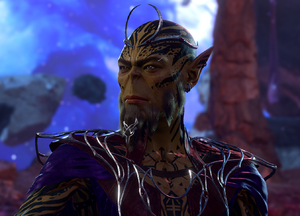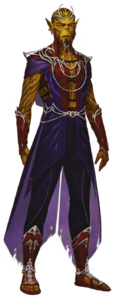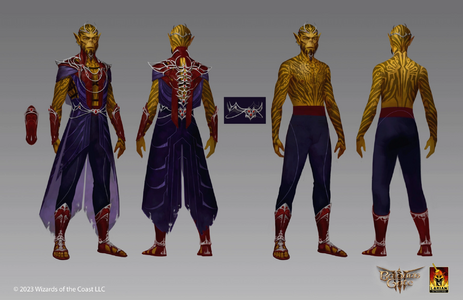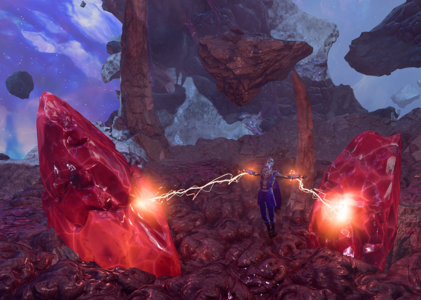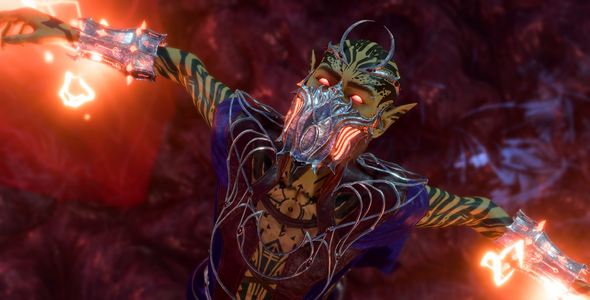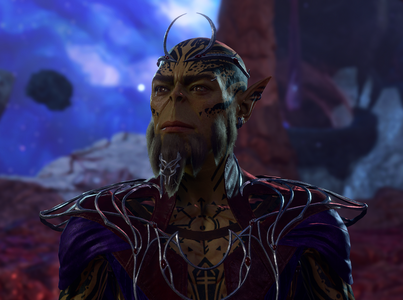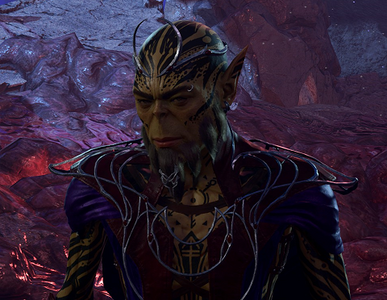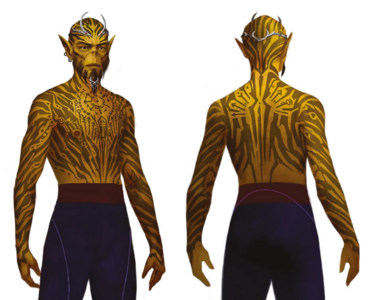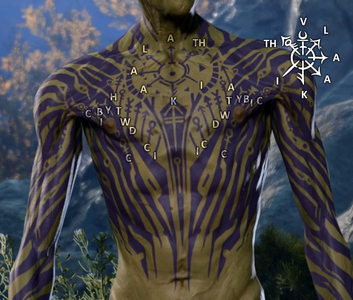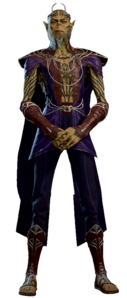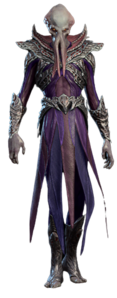Ad placeholder
Orpheus: Difference between revisions
(→Trivia) |
mNo edit summary |
||
| (36 intermediate revisions by 19 users not shown) | |||
| Line 2: | Line 2: | ||
| title = Orpheus | | title = Orpheus | ||
| description = Orpheus is a Githyanki in Baldur's Gate. | | description = Orpheus is a Githyanki in Baldur's Gate. | ||
| image = | | image = Orpheus_Freed.webp | ||
}} | }} | ||
{{ | {{Infobox character | ||
|name=Orpheus | | name = Orpheus | ||
|image= | | image = Orpheus_Freed.webp | ||
| race = [[Githyanki]] | |||
| titles = The Prince of the Comet | |||
| family = | |||
| class = [[Way of the Four Elements]] [[Monk]] | |||
| level = 12 | |||
|race=[[Githyanki]] | |||
| | |||
| | |||
| | |||
| | |||
| modules = | |||
{{Infobox statistics | |||
| child = yes | |||
| size = Medium | |||
| type = Humanoid | |||
| armour_class = 19 | |||
| hit_points = 130 | |||
| weight_kg = 75 | |||
| weight_lb = 165 | |||
| hiddenlevel = 12 | |||
| str = 12 | |||
| dex = 18 | |||
| con = 16 | |||
| int = 14 | |||
| wis = 21 | |||
| cha = 20 | |||
| str_save_proficiency = yes | |||
| dex_save_proficiency = yes | |||
| resistant1 = Psychic | |||
| immune1 = Poison | |||
| condition1_name = Orphic Favour Aura | |||
| condition1_description = Orpheus and nearby allies gain resistance to {{DamageType|Psychic}} damage, and a +3 bonus to INT, WIS, and CHA saving throws. | |||
| feature1_name = Advanced Unarmoured Movement | |||
| feature1_description = Difficult Terrain doesn't slow you down, increased jump while unarmoured. | |||
| feature2_name = Deflect Missiles (passive feature) | |||
| feature2_description = Reduce ranged damage with your reaction. | |||
| feature3_name = Evasion | |||
| feature3_description = Receive less damage from spells or effects that require a DEX Saving Throw. | |||
| feature4_name = Extra Attack | |||
| feature4_description = Make an additional free attack after making an unarmed or weapon attack. | |||
| feature5_name = Ki-Empowered Strikes | |||
| feature5_description = Your unarmed attacks ignore resistances to non-magical damage. | |||
| feature6_name = Martial Arts: Bonus Unarmed Strike | |||
| feature6_description = After an unarmed or monk weapon attack, you can make another unarmed attack as a bonus action. | |||
| feature7_name = Martial Arts: Deft Strikes | |||
| feature7_description = Monk weapon attacks have a floor of 1d4 Bludgeoning. | |||
| feature8_name = Martial Arts: Dextrous Attacks | |||
| feature8_description = Monk weapon and unarmed attacks scale with your DEX, if it is higher than STR. | |||
| feature9_name = Opportunity Attack | |||
| feature9_description = Automatically attack an enemy moving out of your reach. | |||
| feature10_name = Psionic Empowerment | |||
| feature10_description = Your attacks deal 1d6 Psychic damage. | |||
| feature11_name = Purity of Body | |||
| feature11_description = You are Immune to Poison damage and can't be Poisoned or diseased. | |||
| feature12_name = Slow Fall | |||
| feature12_description = When falling, you can use your reaction to gain Resistance to Falling damage. | |||
| feature13_name = Stillness of Mind | |||
| feature13_description = Automatically removes Charmed or Frightened. | |||
| feature14_name = Unarmoured Defence (Monk) | |||
| feature14_description = Add your WIS modifier to your AC. | |||
| feature15_name = Unarmoured Movement | |||
| feature15_description = Your movement speed increases by 6m (20ft). | |||
}} }} | |||
{{SpoilerWarning|act=3}} | |||
{{Q|"Quickly now - even here, we do not have infinite time.|Orpheus after being freed from his prison.}} | {{Q|"Quickly now - even here, we do not have infinite time.|Orpheus after being freed from his prison.}} | ||
'''Orpheus''', is a [[Githyanki]] that appears in [[Baldur's Gate 3]]. He acts as the supposed true ruler of the | '''Orpheus''', is a [[Githyanki]] that appears in [[Baldur's Gate 3]]. He acts as the supposed true ruler of the Githyanki. However, he has been captured and is imprisoned in the [[Astral Plane]]. Being a Githyanki, he seeks to destroy the [[Mind Flayer]]s and remove [[Vlaakith]] from power. | ||
== Overview == | |||
=== Quests === | |||
* [[Discover the history of Prince Orpheus]] | |||
* [[Free Orpheus]] | |||
=== Background === | |||
According to the inscribed discs, banned by followers of Vlaakith and labelled as heretical, Orpheus is the first, and only, son of Mother Gith, the leader of the rebellion that freed the race that would then bear her name, from the Mind Flayer Empire. Sometime after the beginning of their freedom, the collective Gith race split into two cultures; the Githyanki and the Githzerai, the former, Orpheus was a part of. | |||
Upon discovering that Vlaakith I (Not to be confused with [[Vlaakith|Vlaakith CLVII]]) had betrayed his mother, sacrificing her to create a pact with {{FRWiki|Tiamat}}, Orpheus led Gith's Honour Guard in a revolt and named himself the rightful king of the Githyanki, triggering the War of the Comet. At the head of the Honour Guard mounted on red dragons, Orpheus bravely fought Vlaakith's knights in a battle in the Astral Plane, where he praised Mother Gith and accused Vlaakith. Yet he was overcome and defeated in battle against [[Kith'rak Voss]], and was thought dead. | |||
Unknown to all but Vlaakith and Voss; however, Orpheus was instead imprisoned within the Astral Prism, so that Vlaakith may exploit the powers he inherited from his mother. | |||
At some time before the events of Baldur's Gate 3, [[The Emperor]] had discovered the Astral Prism, who proceeded to use it to rebel against the [[The Netherbrain|Elder Brain]]. | |||
== Involvement == | |||
=== Act Three === | |||
Orpheus is only ever mentioned in previous acts, either as the true ruler of the Githyanki people, or as a corruptive force. He is finally found, imprisoned within the Astral Prism when the party enters it to help The Emperor. The Party can either help The Emperor keep him imprisoned, or fight to free him, but only the former yields positive results, as the party, without The Emperor's assistance, falls to the [[Absolute]], and are likely killed by Orpheus and his Honour Guard. | |||
Orpheus' fate is entirely dependent on the player character, and their choices. Several events can occur based on the following criteria; | |||
# If the party collects the [[Orphic Hammer]] through any means, and uses it to free him at the end of the game, he will accompany the party through the final hurdle, and help them destroy [[The Netherbrain|The Netherbrain.]] | |||
#* If the player character refuses to have anyone in their current party turn into a Mind Flayer in order to control the Netherstones, he will turn into a Mind Flayer himself. In this instance, he will desire to die, rather than to live as an abomination, but can be convinced to spare himself, only if [[Lae'zel]] takes his place as the Githyanki people's saviour if she is in the party. | |||
#* If the player character or a party member becomes a Mind Flayer, he will thank them for their sacrifice, promising they will be remembered as a hero. Once The Netherbrain is defeated, he will move to freeing his people from Vlaakith's rule, notably inviting Lae'zel to join him. | |||
#* The player can choose to fight Orpheus after freeing him, but the battle can only lead to a game over: Orpheus kills the party if he wins, and if he is defeated they (naturally) lose his protection and are immediately dominated by the Absolute. | |||
# If the party does not collect the Orphic Hammer, or refuses to use it, The Emperor will consume Orpheus' brain, assimilating his abilities. | |||
Orpheus | If the party chooses to spare Orpheus and become a [[Mind Flayer]] themselves, then Orpheus will speak to them as part of the epilogue. He commends the player character for choosing to make such a sacrifice to defeat the Nethebrain, and promises that they will not be forgotten. Alternatively, if Orpheus chose to become a Mind Flayer he will demand that the party kill him, though passing a DC20 Persuasion check will avoid this. | ||
== Combat == | |||
===Attacks and abilities === | |||
==== Githyanki==== | |||
Orpheus has the [[Orphic Favour Aura (Condition)|Orphic Favour Aura]], giving all allies within 60ft/18m of him the {{cond|Orphic Favour}} condition. | |||
== | In his githyanki form, Orpheus is a {{class|Way of the Four Elements}} and has the following abilities: | ||
{{div col}} | |||
* {{SAI|Greater Invisibility}} | |||
* {{SAI|Sanctuary}} | |||
* {{SAI|Dimension Door}} | |||
* {{SAI|Telekinesis}} | |||
* {{SAI|Globe of Invulnerability}} | |||
* {{SAI|Misty Step}} | |||
* {{SAI|Enhance Leap|Githyanki Psionics: Jump}} | |||
* {{SAI|Stunning Strike (Unarmed)}} | |||
* {{SAI|Stunning Strike (Melee)}} | |||
* {{SAI|Harmony of Fire and Water}} | |||
* {{SAI|Fist of Unbroken Air}} | |||
* {{SAI|Flurry of Blows}} | |||
* {{SAI|Unarmed Strike}} | |||
* {{SAI|Flames of the Phoenix}} | |||
{{div col end}} | |||
==== Illithid ==== | |||
{{see also|Full-illithid}} | |||
{{Infobox statistics | |||
| name = Additional Illithid powers | |||
| image = | |||
| hit_points = 150 | |||
| weight_lb = 120 | |||
| armour_class = 16 | |||
| hiddenlevel = 12 | |||
| str = 13 | |||
| dex = 12 | |||
| con = 14 | |||
| int = 14 | |||
| wis = 21 | |||
| cha = 20 | |||
| str_save_proficiency = yes | |||
| dex_save_proficiency = yes | |||
| condition1_name = Mind Flayer Form | |||
| condition1_description = Affected entity has embraced ceremorphoses and become a Mind Flayer. | |||
| condition2_name = Permanent Mind Sanctuary | |||
| condition2_description = While in combat, this entity can use actions and bonus actions interchangeably. | |||
| feature1_name = Ability Drain | |||
| feature1_description = When you make an attack roll, the attack reduces that target's corresponding ability score by 1. | |||
| feature2_name = Charm | |||
| feature2_description = Charm an enemy that attacks you, preventing it from attacking you till its next turn. | |||
| feature3_name = Cull the Weak | |||
| feature3_description = When you reduce a creature's hit points to fewer than the number of your Illithid powers, it dies and all nearby creatures take {{DamageText|1d4|Psychic}}. | |||
| feature4_name = Favourable Beginnings | |||
| feature4_description = The first attack roll or ability check you make against a target gains a bonus equal to your proficiency bonus. | |||
| feature5_name = Luck of the Far Realms | |||
| feature5_description = Once per Long Rest, you can change a successful attack roll into a critical hit. | |||
| feature6_name = Permanent Mind Sanctuary | |||
| feature6_description = You can use actions and bonus actions interchangeably. | |||
| feature7_name = Psionic Backlash (passive feature) | |||
| feature7_description = When an enemy within 30ft casts a spell, you can use your reaction to inflict {{DamageText|1d4|Psychic}} per the spell's level. | |||
| feature8_name = Psionic Dominance (passive feature) | |||
| feature8_description = When an enemy within 60ft targets you with a spell of a level equal or less than your proficiency bonus, counter that spell. | |||
}} | |||
If he undergoes ceremorphosis, Orpheus will have all the statistics (save his INT, WIS and CHA scores, which remain the same) and powers of a [[full-illithid]]. As well as gaining illithid passives, he will retain his original monk passives (but not abilities). The full-illithid ability [[Permanent Mind Sanctuary]], allows Orpheus to use actions and bonus actions interchangeably. | |||
Orpheus possesses the following illithid abilities: | |||
{{div col}} | |||
* {{SAI|Levitate (Illithid Power)}} | |||
* {{SAI|Tentacle Whip}} | |||
* {{SAI|Potent Concentrated Blast}} | |||
* {{SAI|Mind Blast}} | |||
* {{SAI|Extract Brain}} | |||
* {{SAI|Mind Sanctuary}} | |||
* {{SAI|Strengthened Force Tunnel}} | |||
* {{SAI|Augmented Shield of Thralls}} | |||
* {{SAI|Nebulous Black Hole}} | |||
* {{SAI|Synaptic Consumption}} | |||
* {{SAI|Fierce Perilous Stakes}} | |||
* {{SAI|Fracture Psyche}} | |||
* {{SAI|Displacer Beast Shape}} | |||
* {{SAI|Stage Fright}} | |||
* {{SAI|Transfuse Health}} | |||
* {{SAI|Psionic Overload}} | |||
{{div col end}} | |||
As part of his reason for becoming Illithid, he also possesses: | |||
* {{SAI|Karsus' Compulsion}} | |||
== | ==Loot== | ||
* {{MdRarityItem|Orphic Ring}} | |||
* 2x {{MdRarityItem|Potion of Superior Healing}} | |||
* | |||
==Gallery== | ==Gallery== | ||
<gallery heights="200px" widths="200"> | <gallery heights="200px" widths="200" mode="packed"> | ||
Orpheus Concept Art.png|Concept art | Orpheus Concept Art.png|Concept art. | ||
Orpheus Chained.png| | Orpheus_Concept_Art_Varenev_A.webp|Concept art. | ||
Orpheus Chained.png|Orpheus chained in the Astral Prism. | |||
Oprheus_Tattoo.png|Orpheus' Tattoo in tir'su | Chained.webp|Orpheus chained in the Astral Prism. | ||
Orpheus Tattoo.webp|Tattoo in-game, datamined by [https://twitter.com/chubblot/status/1677410267024564224 Chubblot] | Orpheus_Reason.webp|"''It seems we must be allies''". | ||
Orpheus.png|Orpheus talking. | |||
Oprheus_Tattoo.png|Orpheus' Tattoo in tir'su. | |||
Orpheus Tattoo.webp|Tattoo in-game, datamined by [https://twitter.com/chubblot/status/1677410267024564224 Chubblot]. | |||
Orpheus Model.png|Orpheus' model. | |||
Player Mind Flayer Model.png|Orpheus' illithid model. | |||
</gallery> | </gallery> | ||
== | == Related literature == | ||
* His | * Orpheus' history is mentioned in three githyanki discs: | ||
** Mostly nonsense and a mirrored word for Vlaakith - | ** {{RarityItem|Orpheus, Prince of the Comet, Part One: Betrayal}} | ||
** [[Githyanki]] and [[Githzerai]] use the same writing system but githyanki write clockwise while | ** {{RarityItem|Orpheus, Prince of the Comet, Part Two: Sacrifice}} | ||
* Orpheus is also the name of a [[wikipedia:Orpheus|demigod]] in Greek mythology who traveled with Jason and the Argonauts in pursuit of the Golden Fleece, but was primarily famous for his journey to the Underworld. | ** {{RarityItem|Orpheus, Prince of the Comet, Part Three: Resurrection}} | ||
==Notes== | |||
{{notebegin}} | |||
* His tattoos have writing in [[Githyanki vocabulary|tir'su]] - the [[gith]] [https://forgottenrealms.fandom.com/wiki/Gith_language writing system], see Gallery above. | |||
** Mostly nonsense and a mirrored word for Vlaakith - misspelled as "Alaakith". It was probably written as a defiance to her ways. | |||
** [[Githyanki]] and [[Githzerai]] use the same writing system but githyanki write clockwise while githzerai - counter-clockwise, though unlike Orpheus, the githzerai do not mirror the symbols. | |||
* Orpheus is also the name of a [[wikipedia:Orpheus|demigod]] in Greek mythology who traveled with Jason and the Argonauts in pursuit of the Golden Fleece, but was primarily famous for his journey to the Underworld to save his love Eurydice. | |||
{{noteend}} | |||
== External | == External links == | ||
{{FRWiki|Orpheus|long}} | {{FRWiki|Orpheus|long}} | ||
{{ | {{NavRivington}} | ||
[[Category: Characters in Act 3]] | [[Category: Characters in Act 3]] | ||
[[Category: Githyanki]] | [[Category: Githyanki]] | ||
[[Category: Temporary Companions]] | [[Category: Temporary Companions]] | ||
Revision as of 14:39, 13 May 2024
| Orpheus | |||||||||||||
|---|---|---|---|---|---|---|---|---|---|---|---|---|---|
| Level 12 | |||||||||||||
| Information | |||||||||||||
| Title | The Prince of the Comet | ||||||||||||
| Race | Githyanki | ||||||||||||
| Class | Way of the Four Elements Monk | ||||||||||||
| Stats | |||||||||||||
| Size | Medium | ||||||||||||
| Type | Humanoid | ||||||||||||
| Armour Class | 19 | ||||||||||||
| Hit points | 130 | ||||||||||||
| Weight | 75 kg (165 lb) | ||||||||||||
| Initiative | +4 | ||||||||||||
| Ability scores | |||||||||||||
| |||||||||||||
| Proficiency bonus | +4 | ||||||||||||
| Saving throws |
| ||||||||||||
| Resistances | |||||||||||||
| Immune | Poison | ||||||||||||
| Resistant | Psychic | ||||||||||||
| Conditions | |||||||||||||
| | Orpheus and nearby allies gain resistance to | ||||||||||||
| Features | |||||||||||||
| | Difficult Terrain doesn't slow you down, increased jump while unarmoured. | ||||||||||||
| | Reduce ranged damage with your reaction. | ||||||||||||
| | Receive less damage from spells or effects that require a DEX Saving Throw. | ||||||||||||
| | Make an additional free attack after making an unarmed or weapon attack. | ||||||||||||
| | Your unarmed attacks ignore resistances to non-magical damage. | ||||||||||||
| | After an unarmed or monk weapon attack, you can make another unarmed attack as a bonus action. | ||||||||||||
| | Monk weapon attacks have a floor of 1d4 Bludgeoning. | ||||||||||||
| | Monk weapon and unarmed attacks scale with your DEX, if it is higher than STR. | ||||||||||||
| | Automatically attack an enemy moving out of your reach. | ||||||||||||
| | Your attacks deal 1d6 Psychic damage. | ||||||||||||
| | You are Immune to Poison damage and can't be Poisoned or diseased. | ||||||||||||
| | When falling, you can use your reaction to gain Resistance to Falling damage. | ||||||||||||
| | Automatically removes Charmed or Frightened. | ||||||||||||
| | Add your WIS modifier to your AC. | ||||||||||||
| | Your movement speed increases by 6m (20ft). | ||||||||||||
Spoiler warning: The following content contains unhidden spoilers for Act 3. |
| “ | "Quickly now - even here, we do not have infinite time. |
„ |
| — Orpheus after being freed from his prison. |
Orpheus, is a Githyanki that appears in Baldur's Gate 3. He acts as the supposed true ruler of the Githyanki. However, he has been captured and is imprisoned in the Astral Plane. Being a Githyanki, he seeks to destroy the Mind Flayers and remove Vlaakith from power.
Overview
Quests
Background
According to the inscribed discs, banned by followers of Vlaakith and labelled as heretical, Orpheus is the first, and only, son of Mother Gith, the leader of the rebellion that freed the race that would then bear her name, from the Mind Flayer Empire. Sometime after the beginning of their freedom, the collective Gith race split into two cultures; the Githyanki and the Githzerai, the former, Orpheus was a part of.
Upon discovering that Vlaakith I (Not to be confused with Vlaakith CLVII) had betrayed his mother, sacrificing her to create a pact with ![]() Tiamat, Orpheus led Gith's Honour Guard in a revolt and named himself the rightful king of the Githyanki, triggering the War of the Comet. At the head of the Honour Guard mounted on red dragons, Orpheus bravely fought Vlaakith's knights in a battle in the Astral Plane, where he praised Mother Gith and accused Vlaakith. Yet he was overcome and defeated in battle against Kith'rak Voss, and was thought dead.
Tiamat, Orpheus led Gith's Honour Guard in a revolt and named himself the rightful king of the Githyanki, triggering the War of the Comet. At the head of the Honour Guard mounted on red dragons, Orpheus bravely fought Vlaakith's knights in a battle in the Astral Plane, where he praised Mother Gith and accused Vlaakith. Yet he was overcome and defeated in battle against Kith'rak Voss, and was thought dead.
Unknown to all but Vlaakith and Voss; however, Orpheus was instead imprisoned within the Astral Prism, so that Vlaakith may exploit the powers he inherited from his mother.
At some time before the events of Baldur's Gate 3, The Emperor had discovered the Astral Prism, who proceeded to use it to rebel against the Elder Brain.
Involvement
Act Three
Orpheus is only ever mentioned in previous acts, either as the true ruler of the Githyanki people, or as a corruptive force. He is finally found, imprisoned within the Astral Prism when the party enters it to help The Emperor. The Party can either help The Emperor keep him imprisoned, or fight to free him, but only the former yields positive results, as the party, without The Emperor's assistance, falls to the Absolute, and are likely killed by Orpheus and his Honour Guard.
Orpheus' fate is entirely dependent on the player character, and their choices. Several events can occur based on the following criteria;
- If the party collects the Orphic Hammer through any means, and uses it to free him at the end of the game, he will accompany the party through the final hurdle, and help them destroy The Netherbrain.
- If the player character refuses to have anyone in their current party turn into a Mind Flayer in order to control the Netherstones, he will turn into a Mind Flayer himself. In this instance, he will desire to die, rather than to live as an abomination, but can be convinced to spare himself, only if Lae'zel takes his place as the Githyanki people's saviour if she is in the party.
- If the player character or a party member becomes a Mind Flayer, he will thank them for their sacrifice, promising they will be remembered as a hero. Once The Netherbrain is defeated, he will move to freeing his people from Vlaakith's rule, notably inviting Lae'zel to join him.
- The player can choose to fight Orpheus after freeing him, but the battle can only lead to a game over: Orpheus kills the party if he wins, and if he is defeated they (naturally) lose his protection and are immediately dominated by the Absolute.
- If the party does not collect the Orphic Hammer, or refuses to use it, The Emperor will consume Orpheus' brain, assimilating his abilities.
If the party chooses to spare Orpheus and become a Mind Flayer themselves, then Orpheus will speak to them as part of the epilogue. He commends the player character for choosing to make such a sacrifice to defeat the Nethebrain, and promises that they will not be forgotten. Alternatively, if Orpheus chose to become a Mind Flayer he will demand that the party kill him, though passing a DC20 Persuasion check will avoid this.
Combat
Attacks and abilities
Githyanki
Orpheus has the Orphic Favour Aura, giving all allies within 60ft/18m of him the condition.
In his githyanki form, Orpheus is a and has the following abilities:
Illithid
If he undergoes ceremorphosis, Orpheus will have all the statistics (save his INT, WIS and CHA scores, which remain the same) and powers of a full-illithid. As well as gaining illithid passives, he will retain his original monk passives (but not abilities). The full-illithid ability Permanent Mind Sanctuary, allows Orpheus to use actions and bonus actions interchangeably.
Orpheus possesses the following illithid abilities:
As part of his reason for becoming Illithid, he also possesses:
Loot
Gallery
Tattoo in-game, datamined by Chubblot.
Related literature
- Orpheus' history is mentioned in three githyanki discs:
Notes
- His tattoos have writing in tir'su - the gith writing system, see Gallery above.
- Mostly nonsense and a mirrored word for Vlaakith - misspelled as "Alaakith". It was probably written as a defiance to her ways.
- Githyanki and Githzerai use the same writing system but githyanki write clockwise while githzerai - counter-clockwise, though unlike Orpheus, the githzerai do not mirror the symbols.
- Orpheus is also the name of a demigod in Greek mythology who traveled with Jason and the Argonauts in pursuit of the Golden Fleece, but was primarily famous for his journey to the Underworld to save his love Eurydice.
External links
![]() Orpheus on the Forgotten Realms Wiki
Orpheus on the Forgotten Realms Wiki
